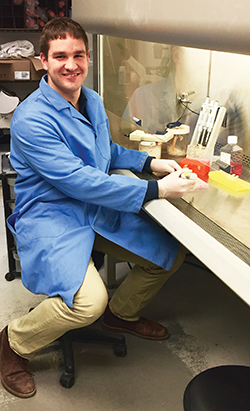Tips for your first undergraduate research experience
So you have been accepted to that summer research internship you applied for? Congratulations! You have worked hard to get to this point. But now what? You may have questions like these: “How can I be successful this summer? Will my supervisor like me? What will be expected of me?”
As a summer intern in research laboratories for the past four summers, I have asked myself these questions. Here are some tips that I have learned:

- Be enthusiastic. First impressions are important. Showing your supervisor and principal investigator that you are excited and grateful to work for them will start you off on the right foot. Say, “Thank you for having me,” and greet your supervisor with a firm handshake on your first day.
- Dress the part. Most laboratories do not require a suit and tie. At the same time, though, jeans and a T-shirt often will not suffice. Try to mirror what your supervisor wears. Looking professional will give others the impression that you are autonomous and capable of doing good work.
- Keep an open mind. You might not get your first choice of project. Not every experiment or task will be fun or interesting. Be open to learning all that you can, and do your best to pick up skills such as being adaptable, anticipating needs and solving problems.
- Take initiative and work hard. If you think of an interesting experiment, ask your mentor about doing it. Offer to help with laboratory or office duties such as taking out the trash.
- Ask good questions. Before you ask for help, try to solve the problem yourself. Scientific literature and product protocols are often very helpful. But make sure you ultimately understand why you are doing what you are doing – do not be afraid to ask questions if you cannot solve the problem on your own!
- Be a good listener. Many people in the laboratory you will be joining have worked there for years. They have extensive knowledge about what you will be working on; use this to your advantage! Listening to someone who has experience with a certain technique could save you weeks of trial and error.
- Get to know your mentor and laboratory members. Take a genuine interest in the projects and lives of the other people in your laboratory. Learning to build connections with people is instrumental to your future successes.
- Accept that failure is a part of science. Experiments often will fail, even if you executed everything perfectly. Use your failed experiments to inform your future work.
- Always think about what you are doing. Experiments can become monotonous. It is easy simply to follow a protocol. Always stay alert and ask yourself: “Does what I am doing make sense? Is there a better way I could test this hypothesis?”
- Keep a good laboratory notebook. One of my mentors once told me: “If you did not write it down, it did not happen.” Also, developing the ability clearly to express your work is a skill you can take with you wherever you go.
- Enjoy the ride. Be serious and put effort into your work, but do not be too attached to the results. Science is a process, and summer internships should give you a sense of what that process is. Do your best, enjoy the experience and do not stress too much when things do not go as planned.
Enjoy reading ASBMB Today?
Become a member to receive the print edition four times a year and the digital edition monthly.
Learn moreFeatured jobs
from the ASBMB career center
Get the latest from ASBMB Today
Enter your email address, and we’ll send you a weekly email with recent articles, interviews and more.
Latest in Careers
Careers highlights or most popular articles

Decoding how bacteria flip host’s molecular switches
Kim Orth will receive the Earl and Thressa Stadtman Distinguished Scientists Award at the ASBMB Annual Meeting, March 7–10, just outside of Washington, D.C.

Defining JNKs: Targets for drug discovery
Roger Davis will receive the Bert and Natalie Vallee Award in Biomedical Science at the ASBMB Annual Meeting, March 7–10, just outside of Washington, D.C.

Upcoming opportunities
No matter where you are in your career and what future path you aspire to, everyone needs leadership skills. Join ASBMB for practical strategies for building and practicing leadership skills.

Close out ASBMB 2026 with a bang
The closing reception of the 2026 ASBMB Annual Meeting will be held at the Torpedo Factory Art Center in Alexandra, Virginia.

Redefining lipid biology from droplets to ferroptosis
James Olzmann will receive the ASBMB Avanti Award in Lipids at the ASBMB Annual Meeting, March 7–10, just outside of Washington, D.C.

Creating change in biochemistry education
Pamela Mertz will receive the ASBMB William C. Rose Award for Exemplary Contributions to Education at the ASBMB Annual Meeting, March 7-10 in Washington, D.C.

